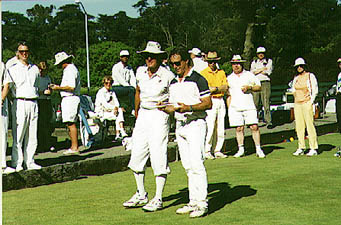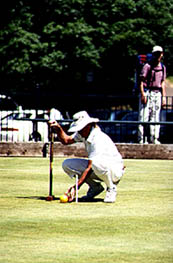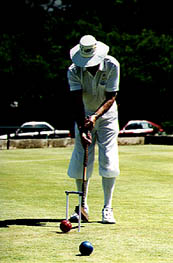

|
Back to |
| The Front Page |
| 1997 Archives |

U.S. SOLOMON/CARTER TEAMS SELECTED,
BUT NOT FINALIZED
Mehas survives Grievance process, now must clear management
by Bob Alman
Declining to comment until all the U.S. team selectees have been contacted and finalized, Bob Kroeger, head of the USCA Selection Committee, has nevertheless confirmed that Mehas is among the selection recommendations to be passed on to the USCA Management Committee, who will accept or reject those recommendations in their meeting of March 18.Historically, the Management Committee has accepted the recommendation of the Selection Committee, but as the duly constituted elected management body of the USCA, it is not obligated to do so and is empowered to act on broader grounds than those of the lesser, appointed committee. CROQUET WORLD has learned that there is not, as of this writing, a solid concensus for approving unaltered the selection recommendations of the Selection Committee, which are...
- SOLOMON TEAM
- John Taves (Washington state)
- Jerry Stark (Northern California)
- Wayne Rodoni (Northern California)
- Phil Arnold (Northern California)
- Don Fournier, Jr. (Arizona)
- Mik Mehas (Southern California)
- CARTER TEAM
- Rory Kelley (Arizona)
- Bill Berne (North Carolina)
- Archie Burchfield (Kentucky)
- Britt Ruby (Texas)
- Richard Powell (Alabama)
- Jacques Fournier (Arizona)
ALTERNATES
- Alan Wolman (Maine)
- Paul Scott (North Carolina)
- Charlie Smith (Northern California)
The selectees above are listed in a heirarchy of eligibility for moving up to fill vacancies. Thus, Rory Kelley is in the first alternate position to move up and play on the Solomon team should there be a vacancy.
KELLEY AND MEHAS ON ICE
Although Taves is not confirmed as this article goes to the Web, it is presumed he will play. Mehas is the main question. Under the rules of selection, the Solomon alternates have first pick on the Carter team, if they so choose. Second alternate Bill Berne, according to Kroeger, has already chosen to play on the Carter team. This leaves Arizonan Rory Kelley in a pivotal spot. He has reportedly chosen not to play in the Carter Challenge. If no space opens for him as a player in the Solomon, he will assist U.S. team manager Rhys Thomas.
On the first two grievances filed against Mehas, the USCA Grievance Committee found there was no cause for punitive action in the Mehas expulson incident at Mission Hills (described in our previous story). For the covert distribution of a questionnaire on the U.S. Open management, however, the Committee sent a letter of reprimand to Mehas. Further, Mehas is barred from competing overseas in international events for the USCA in 1997 - which puts him out of contention for the WCF World Championship in Bunbury, Australia in November, but permits him to be considered for the Solomon and Carter team events, both of which are played in this country. Mehas appears in the latest WCF rankings as the fourth-best American.
Mike Mehas adjusts the angle on a hampered croquet shot. A third official grievance was filed against Mehas, but the Grievance Committee found this grievance, also, did not warrant any penalties. Mik Mehas had earlier told CROQUET WORLD that he trusted the Grievance Committee to make a fair judgment and on that basis he expected to be exonerated.
CROQUET WORLD ONLINE MAGAZINE apologizes to readers and to Mehas for characterizing the Mission Hills incident reported in our previous story as a "brawl." The writer accepted as fact accounts of persons at the tournament who declined to be quoted and therefore cannot be held responsible for the accuracy of their statements.
BURRIDGE COMMENTS ON THE BRITISH TEAM SELECTIONS
Ian Burridge, chairman of the British Selection Committee and the sixth-ranked member of the British team, responded at length to CROQUET WORLD's request for comment on the upcoming Solomon matches. "Unlike your selection committee," Burridge said, "ours does not have guidelines for selecting for events. We tend to start each meeting with a discussion about what our policy will be towards selection for that particular event. Usually we decide to pick the best team (for team events) or the best players for individual events - although we do not want to be tied to this by announcing it as an official policy.
"On this particular occasion for the Solomon Trophy we chose to select our best team - whatever that means! - from the available players. From a personal point of view I regard this as the only just decision, as there are not many croquet test matches in the calendar, and I do not feel it is fair to deprive one of your top players the opportunity of playing for his country in favour of giving someone else a chance. I was exceedingly pleased at the number of our top players who made themselves available for the event, given that it is totally unsupported and the players are having to pay all their own expenses.
"I am looking forward to the match tremendously. Hopefully I will improve on my previous performance in the event!" Burridge continues, referring to his failure to win any games in the previous Solomon matches in 1995 in England.
"Looking at the record books," Burridge observes, "all the matches on American soil have been much more closely contested than those in Great Britain. The scoreline from last year's MacRobertson match is unlikely to be repeated, indeed the individual matches in that match (particularly the doubles) were much more closely contested than the scoreline suggests".
Burridge is referring to the sweeping 20-1 victory of the Brits over the Americans last year. John Taves provided the single America match win in that meeting.
Continuing, Burridge comments, "I see our primary goal to be winning the match and the secondary goal being to improve our chances of winning the 2000 MacRobertson Shield. Obviously the opportunities for such improvement are small, but every little counts. In particular, the experience of playing a test match out of season is invaluable.
"I suppose I can't really finish without expressing my opinion on controversial selections. I do not think that personality should really come into selection for individual events - the best players should be selected. However, for a team event the possible negative effect of an unpopular player on the results of other members of the team (particularly doubles performances) must be carefully balanced against the positive contribution that player can make."
Noting that usually the British put a weaker team into the one-day American rules President's Cup matches following the Solomon, Burridge said, "I'm afraid I have to report that our President's Cup team will be the same as the Solomon Trophy team - no withholding this year!"
CARTER CHALLENGE COMBINES AMERICAN AND INTERNATIONAL RULES
Following the Solomon Tropny matches in Thousand Oaks, California, April 7-11, the Carter Challenge in Palm Beach pits another 6-person American team against an Irish team in matches that are played in both American and International rules. The Irish have selected these players for the Carter Challenge:
- Ronan McInerny
- Simon Williams
- Alan McInerny
- Ed Cunningham
- Charlie Von Schmeider
- Michael O'Shaughnessy
With barely a month before the beginning of the Solomon, only the question of the Mehas selection - and the possible shuffling into place of Kelley as an alternate - remains to be settled, and that question will not be answered until March 18. Until then, the USCA Solomon players will be wondering about the shape of their team.
Solomon player Wayne Rodoni, frequent partner of Mik Mehas for many years, and in full command of his own considerable reputation as "nice guy" as well as a top-ranked player, shakes his head over the Mehas brouhaha. "I don't doubt that Mik has done and said some things it would have been better for him not to have done or said. But most of the stories have been greatly exaggerated. The man is not a saint. But who is?"
Rodoni sheds light on perhaps the clearest lesson to emerge from the investigation of Mehas by the Grievance Committee. If not for this investigation, the ad hoc embellishments of unknown persons to the story of the now-famous incident at Mission Hills might have stood as fact. According to widely circulated stories, Mehas was smuggled into Mission Hills in the trunk of a car. Untrue. Some accounts described a violent confrontation of Mehas with security officials. Untrue. In fairness, one must wonder how much other Mehas stories are exaggerated or fabricated.

Wayne Rodoni has a national reputation as one of croquet's most unflappable "nice guys," despite his frequent partnership with Mike Mehas (left), who's constantly in trouble with the establishment. Here they accept the doubles trophy at the 1996 San Francisco Open.THE DARK LEGEND OF MIK MEHAS
In the short history of USCA croquet, several personal legends have emerged, all of them benign - until Mehas. First there was the legend of a country bumpkin in overalls and a pick-up truck rolling into Palm Beach and confounding the socialite glitterati with his expert play; then there was the legend of the tiny wunderkind from the Southernwestern desert who, with his similarly scaled-down mallet, took on the champions and beat them at their own game. (The actual persons who carry the burden of these legends are among the 1997 selectees: Archie Burchfield of Stamping Ground, Kentucky; and Jacques Fournier, of Phoenix, Arizona.)
But the legend of Mehas has shaped itself in darker, ominous tones. For some, it is simply about a figure of irrepressible vulgarity. For others, the subject is deliberately evil, forever unrepentent and unredeemable. Many believe that such a presence can poison the image of the croquet establishment as it sees itself and wishes to be seen by the world. Opinions fall out broadly in these two camps:
One side seems convinced that Mik Mehas is a hopeless case, that his association in any way with USCA croquet is bad for the sport. As one respected figure who declines to be identified said, "He is a bad man. He is bad for croquet. Something needs to be done about it." On this side of the issue, facts of particular grievances are beside the point. The ultimate truth of the issue, for these hard-liners, is that the corrupting influence of Mehas should be excised from the body of USCA croquet.
The other side can be repesented by a member of the Management Committee (also asking not to be identified) who sighs wearily and declares with more than a hint of disgust: "This is a waste of time! This is a non-issue! Instead of spending all this energy trying to get rid of one USCA member, we should be working on getting 10,000 more people into the USCA!"
Mik Mehas in form and in action cuts a sporty figure on the court.Whatever decision is taken by the Management Committee on team selections, one thing is certain: The dark legend of Mik Mehas has already colored the image of America's most elegant sport - a sport that in coming of age learns to accommodate more than one single, iconographic image, style, and personality. If Mehas did not exist, he would have to be invented, and he is being constantly invented and reinvented. The legend of Mik Mehas, as we have seen, may bear little resemblance to the man, and it is beyond his or anyone's control.
Wherever croquet is played in America - in country clubs and resorts, on public lawns in municipal parks, at private residential developments, in the back yards of croquet fanatics, on the estates of the wealthy - players linger at courtside, idly looking out over a manicured lawn where a white-clad figure plays a break, and into the silence broken only by the clack of roqueted balls, someone breathes the name of croquet's dark legend. "Have you heard the latest?" Ears prick up, the air is electric with expectation. "No! What's he done now?"

